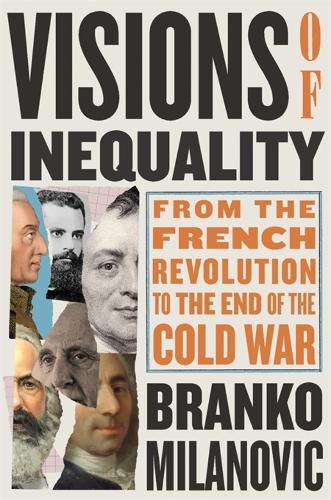Readings Newsletter
Become a Readings Member to make your shopping experience even easier.
Sign in or sign up for free!
You’re not far away from qualifying for FREE standard shipping within Australia
You’ve qualified for FREE standard shipping within Australia
The cart is loading…






A sweeping and original history of how economists across two centuries have thought about inequality, told through portraits of six key figures.
"How do you see income distribution in your time, and how and why do you expect it to change?" That is the question Branko Milanovic figuratively puts to six very different economists: Francois Quesnay, Adam Smith, David Ricardo, Karl Marx, Vilfredo Pareto, and Simon Kuznets. Probing their lives and works, he charts the evolution of thought on inequality, showing just how much views have varied among ages and societies. Indeed, Milanovic argues, we cannot speak of "inequality" as a general concept: any analysis of it is inextricably linked to a particular time and place.
Visions of Inequality takes us from Quesnay and the physiocrats, for whom social classes were prescribed by law, to the classic nineteenth-century treatises of Smith, Ricardo, and Marx, who saw class as a purely economic category driven by means of production. It shows how Pareto reconceived class as a matter of elites versus the rest of the population, while Kuznets saw inequality arising from the urban-rural divide. And it explains why inequality studies were eclipsed during the Cold War, before their remarkable resurgence as a central preoccupation in economics today.
Meticulously distilling each author's view of income distribution from their often voluminous writings, Milanovic offers an invaluable genealogy of the discourse surrounding inequality. These intellectual portraits are infused not only with a deep understanding of economic theory but also with psychological nuance, reconstructing each thinker's outlook within the limitations of what was knowable to them within their historical contexts and methodologies.
$9.00 standard shipping within Australia
FREE standard shipping within Australia for orders over $100.00
Express & International shipping calculated at checkout
Stock availability can be subject to change without notice. We recommend calling the shop or contacting our online team to check availability of low stock items. Please see our Shopping Online page for more details.
A sweeping and original history of how economists across two centuries have thought about inequality, told through portraits of six key figures.
"How do you see income distribution in your time, and how and why do you expect it to change?" That is the question Branko Milanovic figuratively puts to six very different economists: Francois Quesnay, Adam Smith, David Ricardo, Karl Marx, Vilfredo Pareto, and Simon Kuznets. Probing their lives and works, he charts the evolution of thought on inequality, showing just how much views have varied among ages and societies. Indeed, Milanovic argues, we cannot speak of "inequality" as a general concept: any analysis of it is inextricably linked to a particular time and place.
Visions of Inequality takes us from Quesnay and the physiocrats, for whom social classes were prescribed by law, to the classic nineteenth-century treatises of Smith, Ricardo, and Marx, who saw class as a purely economic category driven by means of production. It shows how Pareto reconceived class as a matter of elites versus the rest of the population, while Kuznets saw inequality arising from the urban-rural divide. And it explains why inequality studies were eclipsed during the Cold War, before their remarkable resurgence as a central preoccupation in economics today.
Meticulously distilling each author's view of income distribution from their often voluminous writings, Milanovic offers an invaluable genealogy of the discourse surrounding inequality. These intellectual portraits are infused not only with a deep understanding of economic theory but also with psychological nuance, reconstructing each thinker's outlook within the limitations of what was knowable to them within their historical contexts and methodologies.